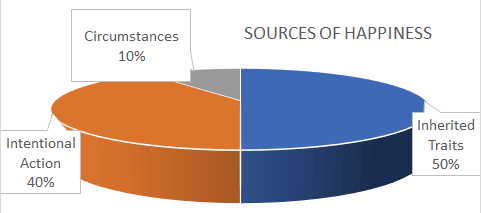“We cannot allow our happiness to depend on our external circumstances, for every positive event and accomplishment we experience are accompanied by rapid adaptation and escalating expectations.” – Sonia Lyubomirsky
Dr. Sonia Lyubomirsky has made it her life’s work to help folks become happier. No, she’s not running around doling out million-dollar checks, giving people makeovers, or helping them find their perfect mates. Rather, she leverages evidence-based research to determine which factors demonstrably lead to elevated happiness. She captured her insights in The How of Happiness: A Scientific Approach to Getting the Life You Want.
Lyubomirsky defines happiness as “the experience of joy, contentment, or positive well-being, combined with a sense that one’s life is good, meaningful, and worthwhile.” Studies suggest that this experience eludes more than half of all adults who are otherwise deemed “moderately mentally heathy.” And in our less than happy state, we’re not as sociable, energetic, creative, flexible, productive, resilient, healthy, long-lived, and successful as we might otherwise be.
If counting ourselves among the less-than-happy, we may fall prey to one of three happiness myths. The fatalists among us would argue that you’re either happy or you’re not. If the latter, too bad, so sad. The hopefuls among us may believe that happiness is “out there” and rely upon effort and/or good fortune to catch it. The strivers among us might put forth great effort to change their circumstances to increase their odds of finding it. For the latter, it’s all about being richer, thinner, more attractive, more successful, more popular, blissfully married, etc. Ironically, materialism is strong predictor of unhappiness! It doesn’t bring lasting happiness1 and when pursued often proves a distraction from more fruitful action.
Studies conducted on identical twins (raised together and apart) and fraternal twins show that inherited traits account for about 50% of baseline happiness. As such, even if one were not endowed with the cheeriest of genes, there’s still a lot of wiggle room to improve baseline happiness. Moreover, we know from our study of epigenetics that environment plays a large role in the extent to which genes are expressed. That finding gives hope that any adverse tendencies may be overcome.
Findings from another gaggle of studies reveal that 40% of our happiness level can be attributed to our intentional activity and 10% on our circumstances (assuming they’re not truly dire). Focused energy around attitudes and daily actions pays greater dividends in happiness than undue striving for the best body, face, career, house, car, partner, et al. It’s all about what we do and how we think.
Lyubomirsky and her team have identified 12 concrete strategies that have been shown to elevate happiness when practiced consistently. They are:
- Express gratitude.
- Cultivate optimism.
- Avoid overthinking and social comparison.
- Practice acts of kindness.
- Nurture relationship.
- Develop coping strategies.
- Learn to forgive.
- Pursue engaging activities.
- Savor life’s joys.
- Commit to goals.
- Practice religion or spirituality.
- Take care of your body.
I’ll go into these strategies in more detail in subsequent posts. Suffice it to say that happiness-building is not a one-size-fits-all activity. Some of these strategies will feel more natural, enjoyable, and/or valuable than others. Some will more readily adapt into one’s lifestyle and/or strengths. And some may grow stale with repeat use. The author encourages experimentation to see what works and suggests mixing things up regularly to keep the enterprise fresh and interesting.
1 Social scientists refer to our tendency to become acclimated to changes in circumstances as hedonic adaptation. While we might get really excited in the immediate aftermath of a favorable windfall, our happiness thereafter typically reverts to the previous set point. Mercifully, this mechanism works to our favor in the wake of unfortunate events.
